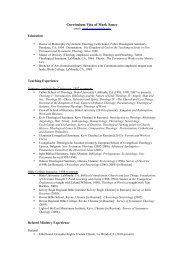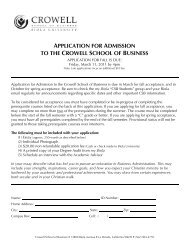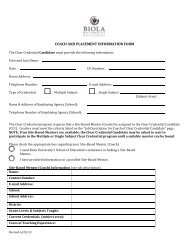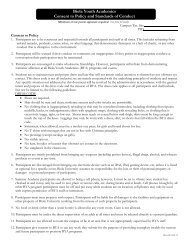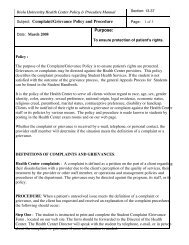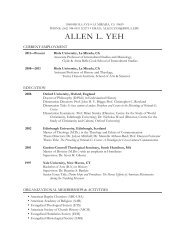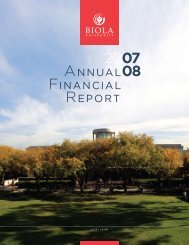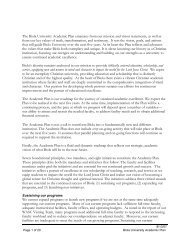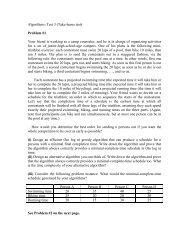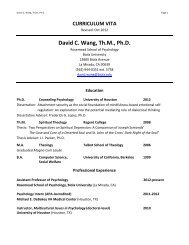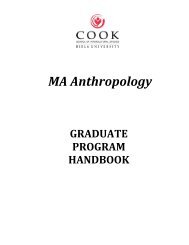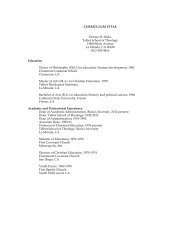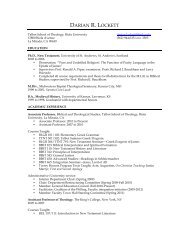Create successful ePaper yourself
Turn your PDF publications into a flip-book with our unique Google optimized e-Paper software.
the history of ethics in light of the contemporary mileu and<br />
practical ethical issues such as divorce, abortion, homosexu-<br />
ality, euthanasia and the human control of human beings.<br />
Required of Psy.D., Ph.D.<br />
rsth 730 independent study ............................................................ 1–3<br />
Individual work, directed reading or special problems in theol-<br />
ogy. Such study must be done with the approval and supervi-<br />
sion of a faculty professor of record. The student is expected<br />
to submit a detailed course proposal on a learning contract<br />
form available from the Registrar’s Office. Required courses<br />
may not be taken through independent study. Elective.<br />
I n t e G r at I o n o f P s yC h o l o G y<br />
& t h e o l o G y ( r s t P)<br />
Rosemead’s curriculum is distinguished by a series of seminars designed<br />
to investigate the mutual relationships between theological<br />
and psychological concepts and data. These seminars constitute an<br />
essential part of Rosemead training and offer students an opportunity<br />
to become involved in a creative application of shared insights<br />
from these related disciplines. Each student must take RSTP 500 and<br />
721, and additional integration seminars to total 14 units.<br />
rstP 500 Psychotherapy & religion ....................................................1<br />
An introduction to the contributions a biblical understanding<br />
of human nature can make to the psychological practitioner’s<br />
understanding of the therapeutic process. Special attention<br />
is given to the relational dimension of human growth and<br />
development. Required of all first year students to be taken<br />
concurrently with RSPY 680 (Pre-practicum).<br />
rstP 7<strong>05</strong> Psychology of religion ..........................................................2<br />
A survey of the psychology of religion research emphasiz-<br />
ing both content and methodological issues. Topics covered<br />
include religiosity and mental health, measures of religiosity,<br />
religious development, correlates of religiosity and psycho-<br />
logical aspects of conversion and other religious aspects.<br />
Prerequisite: RSTP 500. Elective.<br />
rstP 710 sin & Psychopathology .........................................................2<br />
An advanced seminar exploring the concepts of sin and<br />
psychopathology. Includes a discussion of the nature and<br />
essence of psychopathology and the relationship of personal,<br />
parental and societal responsibility in personality develop-<br />
ment and functioning. Prerequisite: RSTP 721.<br />
rstP 714 Conflicts in the integration of Psychology<br />
& Theology .................................................................................2<br />
A consideration of tensions between psychology and theol-<br />
ogy in areas such as self-esteem, corporal punishment, sex<br />
roles, egalitarianism, and divorce. A synthesis model is used for<br />
thinking constructively about such tensions and identifying<br />
strengths and weaknesses of traditionally conflicting view-<br />
points. Prerequisite: RSTP 721. Elective.<br />
rstP 715 Contemporary Psychoanalysis & religion ......................3<br />
The history of the concept of transference is traced, particular-<br />
ly as pertains to controversies in contemporary psychoanalysis<br />
over historical truth vs. narrative truth, and reality vs. illusion,<br />
with special attention to the formation and use of God as a<br />
foreground and background object in light of modern infant<br />
observational research. Prerequisite: RSTP 721. Elective.<br />
rstP 720 Psychotherapy With religiously<br />
Committed Patients ...............................................................3<br />
This course is a chance to share practical ways of address-<br />
ing clinical themes, as well as broader conceptual issues like<br />
developing a personally meaningful, on-going theology of<br />
therapy. Certain themes if handled one way allow therapy<br />
with religiously committed patients to take on more depth;<br />
if handled in other ways the work assumes a more superficial<br />
quality and meets with a kind of therapeutic stalemate, even<br />
when therapist and patient are both persons of faith. Prerequi-<br />
site: RSTP 721. Elective.<br />
rstP 721 The nature & scope of integration ...................................3<br />
This course includes a discussion of the models, levels and<br />
areas in which integration of the theological and psychologi-<br />
cal can occur, as well as a framework for conceptualizing the<br />
scope of integration. Prerequisite: RSTH 521. Required of Ph.D.,<br />
284 Rosemead School of Psychology B I O L A U N I V E R S I T Y<br />
Psy.D.<br />
rstP 722 systems of integration ..........................................................3<br />
A critical evaluation of the works of specific theologians and<br />
psychologists who have attempted to integrate the disci-<br />
plines of psychology and theology. Attention is given to the<br />
approaches of such theorists as Browning, Crabb, Narramore,<br />
Rizutto and Tourniér. Prerequisite: RSTH 521. Elective.<br />
rstP 725 Psychotherapy & spirituality ........................................... 2–3<br />
This course is designed to increase students’ awareness of the<br />
integral process of growth in psychotherapy and spirituality.<br />
Course material focuses on an understanding of the nature<br />
of psychological and spiritual growth, and an experimental<br />
awareness of that growth process. Prerequisite: RSTP 721.<br />
Elective<br />
rstP 730 mental health issues for Crosscultural sojourners .....2<br />
A study of the contributions psychologists can make to the<br />
missionary enterprise including cross-cultural adjustment<br />
issues facing sojourners. Additional topics vary from semester<br />
to semester but include content such as the selection and<br />
evaluation of missionary candidates; pre-field orientation<br />
and training; on field training and intervention services to<br />
sojourners; coping with transitions; and the unique identity<br />
and adjustment issues of Third Culture Kids. Prerequisite: RSTP<br />
721. Elective.



